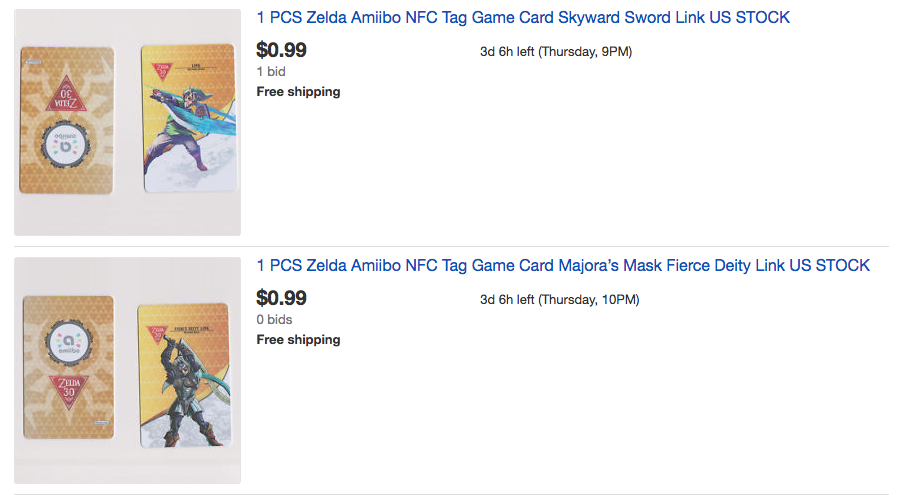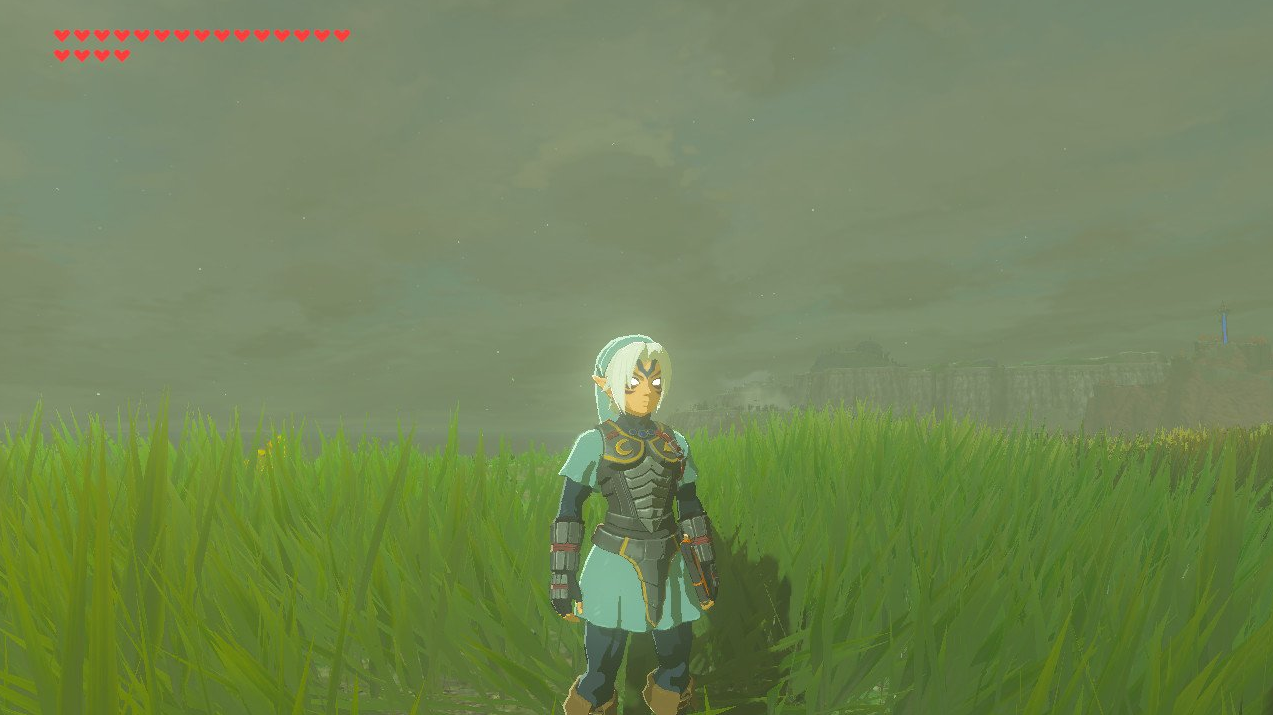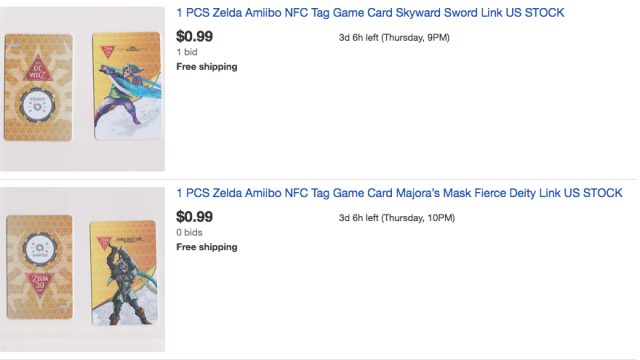With Legend of Zelda Amiibo figures perpetually sold out and fetching prohibitively high prices on eBay, many fans are turning to bootlegged “Amiibo cards” instead. Many sellers of these cards see themselves not as mere pirates, but as modern-day Robin Hoods, providing fans with the in-game content that Nintendo won’t sell them.
One seller from Etsy, a baker from South Wales who asked not to be named, says he started selling bootlegs in response to the rising prices of Nintendo’s figures.
“I refused to pay scalper prices,” he said. “It’s not fair; Nintendo needs to produce more stock otherwise people will seek other options.”
Amiibo are electronic toy figurines sold by Nintendo that can communicate with games for Wii U, 3DS, and now Switch. While they have plenty of appeal for collectors looking to line a shelf with colourful video game statues, they also have embedded near-field communication, or NFC, chips that allow players to access unique in-game content
This year, Nintendo released a line of Breath of the Wild Amiibo that give players extra items or features in the new Zelda game. But even older Amiibo figures give out bonus items in the new game. If you have a Toon Link figure, you can unlock his trademark cel-shaded tunic. The Princess Zelda Amiibo from the Smash Bros. line unlocks a powerful light-arrow weapon.
When Nintendo first launched Amiibo in 2014 alongside Super Smash Bros., the characters were printed in extremely low numbers and quickly became scarce, with some reaching highs of hundreds of dollars each on eBay. Last year, Nintendo upped the production quantities and brought supply into balance with demand, but that all changed with the hugely successful launch of Breath of the Wild.
All Zelda-related figures are now sold out, even on Nintendo’s official online store, leaving a vast and profitable market on sites like eBay.
Consider the case of the Smash Bros. Link Amiibo. A once-common Amiibo of a classic character, it is now nowhere to be found on Nintendo’s online store. Outlets like GameStop might offer to sell it for the MSRP of $US12.99 ($17), but that’s subject to availability. When The Legend of Zelda: Breath of the Wild came out, it was revealed the Amiibo could summon Link’s iconic steed, Epona.
As a result, the figure currently sells for $US60 ($81) to $US70 ($94) on Amazon. Slightly lower prices can occasionally be found on eBay. That’s a lot to pay for one figure. Because of that, it’s much cheaper to make your own. And pretty easy, too.

Neither Skyward Sword or Fierce Deity Link have been released as figures but you can still buy their bootleg amiibo cards.
Making your own Amiibo doesn’t mean sculpting a figurine. You can make a card that functions just like the toy with off-the-shelf parts. You can purchase a stacks of NFC cards at low cost on eBay. They’re also not proprietary Nintendo technology, meaning that anyone can build an ersatz Amiibo with the right tools — which you may already have at home. Recent Android devices like Google’s Nexus 10 tablet or HTC smartphones can use applications to write data directly to NFC cards. TagMo is a popular app that comes preloaded with data for countless hard-to-find figures — even unreleased ones.
With demand high and supply almost nonexistent, a cottage industry has grown on sites like Etsy and eBay, where Amiibo cards are sold cheaply en masse. In researching this story, I purchased dozens of Amiibo cards to use with The Legend of Zelda: Breath of the Wild including one with data for the Fierce Deity Link Amiibo, which Nintendo has yet to release, for $US50 ($67). They arrived in excellent condition, meticulously crafted and placed in protective card holders, and worked perfectly.
The Legend of Zelda: Breath of the Wild speedrunners often use Amiibo in their runs to gain items, summon boxes to launch into the air, or summon multiple copies of Epona for fast travelling around the spacious game world. Often, the items they use on stream are bootleg copies.
Orcastraw, a Breath of the Wild speedrunner, uses a piece of homebrew Wii U software to rewrite the data of Nintendo’s official Animal Crossing cards to whatever she needs for her speedruns. “My speedruns spawn about 8 Epona and 32 boxes [from the Guardian Amiibo], so using cards helps save costs,” Orcastraw said.
The software, created by a speedrunner and glitch hunter called dragonbane0, swaps the configuration data of any two Amiibo. Since it’s a Wii U program, you don’t even need a smartphone.

Using Amiibo cards, I was able to gain special items that are otherwise inaccessible.
Like every other seller I spoke with, the South Wales Etsy merchant said he saw a strong spike in sales when The Legend of Zelda: Breath of the Wild released in March. Beginning by selling cards on eBay at £15 (about $26) each, the seller said he was about to purchase a Nintendo Switch and redecorate his bathroom with the profits.
Instead, he received a seven-day suspension from eBay, which claimed that the seller was in violation of its terms of service for selling materials that circumvented copyright. That’s when he moved the business to Etsy.
Another seller, a veterinarian who also asked to remain anonymous, started selling online as a hobby after making some cards for some friends. Her initial listings sold quickly, although she began to wonder if what she was doing was OK.
“I actually reached out to [Nintendo] via email asking them what their stance on custom printed cards was and never got a response,” the seller said. “I’m not trying to compete with Nintendo in any way,” she said. “I’m attempting to give players a more economical way to get their Amiibo fix than paying $60 on eBay for a single figure.”
Eventually, the seller got her answer in the form of a Digital Millennium Copyright Act notice from Nintendo, which noted that the Etsy listings contained “multiple violations of the exclusive rights holder…for the unauthorised copy/copies of Nintendo Amiibo products.”
“These items contain copyrighted software by NOA and/or the unauthorised use of Nintendo trademarked artwork,” the notice read, promising that no further legal action would be taken if the seller removed her listings within 24 hours. Otherwise, it said, Nintendo would seek “statutory damages of up to $US150,000 [$201,960] per work for willful infringement”. (Nintendo did not respond to Kotaku’s request for comment on this story.)
In the words of sellers and buyers, the rise of bootlegged Amiibo cards is about scarcity, not piracy. With Nintendo unwilling or unable to produce enough figures to keep prices from skyrocketing, it creates an unfilled market opportunity for enterprising bootleggers. And the ease of creating Amiibo cards means that for every seller Nintendo swats down, ten more can pop up in their place. The only permanent solution to the problem would be to make Amiibo so prevalent in the marketplace that it wouldn’t make economic sense to pirate them.
“No big deal. Fun while it lasted,” said the veterinarian. “Hopefully Nintendo releases more of their older Amiibo figures for people that want them. Paying $60 for a SSB Link is just a little stupid.”

Comments
12 responses to “The Bootleg Amiibo Business Is Booming, Thanks To Nintendo”
This is why I hate nintendo as a company. They simply refuse to ever meet demand and let people buy their product yet when someone does something about it they threaten with law suits.
This is well and truly gaming’s “Obama was born outside America and is a Muslim” and I don’t know how we got here.
Swing low, sweet chariot….
Your response is the “I’m a dickbag who doesn’t respond to people’s posts with an actual argument, I just say its analogous to something stupid and unrelated, then use that as an excuse to smugly dismiss it.” of the internet.
It’s like you know me.
I was missing the Ocarina of Time link and found some random web store on the 3rd page of Google search results and snagged it. The others are on pre order. I really like the figurines, the other stuff is just a bonus.
^ Totally this. I have a big pile of them at home because they look freaking cool. I think I used the Ocarina Link once, got Epona, that’s about it.
Yeah, Epona is the most used horse here. The white one is pretty good but Epona has a higher top speed.
I might have had some sympathy for the guy if he wasn’t also being blatantly opportunistic with his pricing!
Identifies a gap in the market, takes advantage of this. Seems like sales 101 to me. To be fair, it takes like 5 min to learn how to do it yourself, using cheap NFC cards and most newer Android phones. If you’re lazy, you pay the lazy person tax imo
No sympathy for Nintendo. They create their own problems.
Given that Amiibo figures are both physical toys and a key to unlock access to digital content. It is this second aspect where the DMCA kicks in: it is not much different to if you reverse engineered how to generate Steam keys, and started selling them on eBay without the game developer’s permission.
It does suck that the supply of Amiibos is much smaller than the demand, but legally speaking Nintendo is under no obligation to sell one to everyone who wants to buy one.
Its like nintendo actively tries to encourage people to pirate their shit by having shitty buisness practices, And then has a sook when people actually pirate their stuff.
Here is an idea Nintendo. Release a shit ton of stuff. People will buy it and you wont have to resort to shady measures.
Or at least listen to market demand, they could easily make those cards themselves, they made the Animal Crossing ones. If the physical toy part is the limiting factor this would get around it, though knowing them they would package them in sealed random boosters because nothing can be easy with them.